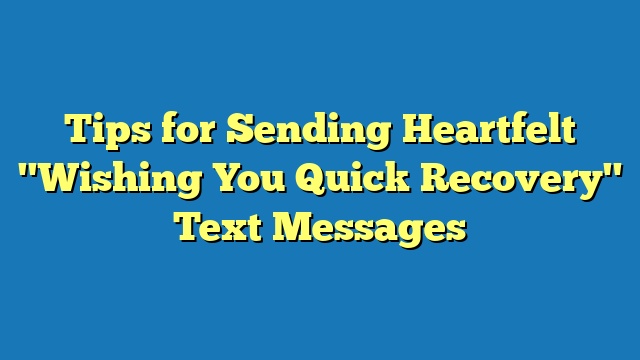“Wishing you quick recovery text messages” are a thoughtful way to offer support and comfort to someone who is ill or recovering from an injury or surgery. They can be sent via text message, email, or social media.
These messages are important because they can help the recipient feel less alone and more supported. They can also provide a much-needed distraction from their illness or injury.
Historically, people have always offered well wishes to those who are ill. However, the advent of text messaging has made it easier than ever to send a quick and easy message of support.
Wishing You Quick Recovery Text Messages
Wishing someone a quick recovery is a thoughtful and compassionate gesture. Text messages are a convenient and effective way to send well wishes, as they can be sent quickly and easily, and can be read at the recipient’s convenience.
- Thoughtful
- Considerate
- Supportive
- Encouraging
- Uplifting
- Positive
- Caring
- Sympathetic
- Empathetic
These qualities make wishing someone a quick recovery via text message a meaningful way to show your support. When sending a recovery text message, it is important to be sincere and personal. You can also include specific details about what you are wishing for the recipient, such as a speedy recovery, a comfortable recovery, or a pain-free recovery. It is also important to be respectful of the recipient’s privacy and wishes. If you are not sure if the recipient wants to receive text messages, it is best to err on the side of caution and not send one.
Thoughtful
Expressing well wishes through a quick recovery text message can be a thoughtful gesture, demonstrating care, support, and concern for an individual’s well-being.
-
Consideration
A thoughtful text message takes into account the recipient’s feelings and needs, offering words of encouragement, support, and understanding.
-
Personalization
Including personal details or anecdotes in the message adds a heartfelt touch, demonstrating a genuine connection and understanding of the recipient’s situation.
-
Timely
Sending a text message at an appropriate time, such as shortly after hearing about the recipient’s illness or injury, shows that you are thinking of them and care about their well-being.
-
Conciseness
While thoughtfulness is important, it is equally crucial to be mindful of the recipient’s time and attention. A concise and well-written message conveys well wishes without overwhelming them with excessive text.
In essence, a thoughtful quick recovery text message combines consideration, personalization, timeliness, and conciseness to express genuine care and support for the recipient during a challenging time.
Considerate
Wishing someone a quick recovery is a considerate gesture that can provide comfort and support during a difficult time. Consideration involves being mindful of the recipient’s feelings, needs, and preferences.
-
Empathy
Considerate text messages demonstrate empathy by acknowledging the recipient’s situation and expressing understanding of their pain, discomfort, or challenges.
-
Respect
Respect is shown by being mindful of the recipient’s privacy and wishes. Sending messages at appropriate times and avoiding overwhelming them with excessive communication demonstrates consideration.
-
Personalization
Personalizing messages by including specific details or anecdotes shows that the sender has taken the time to consider the recipient’s unique circumstances and offer tailored support.
-
Conciseness
While thoughtfulness is important, consideration also involves being mindful of the recipient’s time and attention. Sending concise and well-written messages ensures that the well wishes are conveyed without overwhelming the recipient.
Considerate quick recovery text messages combine empathy, respect, personalization, and conciseness to provide genuine comfort and support to the recipient during a challenging time.
Supportive
Wishing someone a quick recovery through text messages conveys support and encouragement during a difficult time. It goes beyond merely expressing well wishes and delves into providing emotional and practical assistance.
-
Emotional Support
Supportive text messages offer emotional comfort and reassurance. They acknowledge the recipient’s feelings and provide words of encouragement, empathy, and positivity.
-
Practical Assistance
Beyond emotional support, supportive text messages can offer practical assistance. They may include reminders about medication, appointments, or errands that need to be run.
-
Information and Resources
Supportive text messages can provide valuable information and resources to the recipient. Sharing articles, websites, or contacts of support groups demonstrates care and a willingness to help.
-
Connection and Companionship
Regular supportive text messages help maintain a sense of connection and companionship. They remind the recipient that they are not alone and that someone cares about their well-being.
In conclusion, supportive quick recovery text messages combine emotional support, practical assistance, information sharing, and connection to provide a comprehensive and meaningful way to express care and support during a challenging time.
Encouraging
Encouraging messages are a vital component of wishing someone a quick recovery. They provide emotional support and motivation, which can have a positive impact on the recipient’s healing process.
Encouraging messages can help to:
- Boost the recipient’s spirits
- Provide a sense of hope and optimism
- Remind the recipient of their strength and resilience
- Motivate the recipient to stay positive and focused on their recovery
When crafting an encouraging message, it is important to be sincere and specific. Avoid using generic phrases or clichs. Instead, focus on the recipient’s individual situation and offer specific words of encouragement and support. For example, you might say something like:
- “I know you’re going through a tough time right now, but I want you to know that I’m here for you.”
- “I’m so proud of the progress you’ve made so far. Keep up the good work!”
- “I’m thinking of you and sending you all my best wishes for a speedy recovery.”
Encouraging messages can make a real difference in someone’s recovery. By providing emotional support and motivation, you can help them to stay positive and focused on their healing.
Uplifting
Within the realm of “wishing you quick recovery text messages,” the aspect of “Uplifting” holds significant importance. It encompasses qualities that aim to raise the recipient’s spirits, instill a sense of optimism, and promote an overall positive outlook during their recovery journey.
-
Positive Reinforcement
Uplifting text messages provide positive reinforcement, acknowledging the recipient’s progress, resilience, and strength. They focus on the positive aspects of the situation, encouraging the recipient to stay motivated and maintain a hopeful attitude.
-
Inspiration and Motivation
Through words of encouragement and inspiration, uplifting messages aim to motivate the recipient. They remind the recipient of their inner strength, resilience, and the support system that surrounds them, fostering a belief in their ability to overcome challenges.
-
Emotional Support
Uplifting messages offer emotional support by expressing care, empathy, and understanding. They convey that the sender is there for the recipient, providing a sense of comfort and reassurance during difficult times.
-
Hope and Optimism
By instilling hope and optimism, uplifting messages promote a positive mindset. They emphasize the potential for improvement, remind the recipient of past successes, and encourage them to look forward to a brighter future.
By incorporating these facets into “wishing you quick recovery text messages,” individuals can create meaningful and effective messages that not only convey well wishes but also uplift the recipient’s spirits, foster resilience, and contribute to their overall well-being during the recovery process.
Positive
In the context of “wishing you quick recovery text messages,” “Positive” holds significant importance as a crucial component that enhances the effectiveness and impact of these messages. Positive language and affirmations play a vital role in promoting emotional well-being, fostering resilience, and contributing to a speedier recovery process.
The connection between “Positive” and “wishing you quick recovery text messages” is multifaceted. Firstly, positive messages have the power to uplift the recipient’s spirits, instilling a sense of hope and optimism during challenging times. By focusing on the positive aspects of the situation, these messages counteract negative thoughts and emotions, promoting a more positive mindset conducive to healing.
Moreover, positive affirmations embedded within “wishing you quick recovery text messages” can positively influence the recipient’s self-perception and self-confidence. When individuals receive messages that emphasize their strength, resilience, and progress, it reinforces their belief in their own abilities to overcome challenges and recover fully. This positive self-belief can have a significant impact on their overall recovery journey, fostering a sense of empowerment and motivation.
Caring
In the realm of “wishing you quick recovery text messages,” “Caring” emerges as a pivotal concept that profoundly shapes the nature and impact of these messages. Caring encompasses a deep sense of empathy, concern, and compassion for the recipient’s well-being, extending beyond mere well wishes.
A crucial component of “wishing you quick recovery text messages,” Caring manifests in the genuine concern and support expressed through the words chosen. It is not simply about conveying a desire for a speedy recovery but also about acknowledging the recipient’s feelings, offering emotional support, and fostering a sense of connection during a challenging time. Caring messages convey a profound understanding of the recipient’s situation, providing comfort and reassurance that they are not alone in their recovery journey.
Sympathetic
Within the context of “wishing you quick recovery text messages,” the aspect of “Sympathetic” holds great significance as it encapsulates the sender’s ability to empathize with and understand the recipient’s situation, feelings, and needs during their recovery journey.
-
Emotional Understanding
Sympathetic messages demonstrate a deep comprehension of the recipient’s emotional state. They acknowledge and validate the recipient’s feelings, offering words of comfort and support that resonate with their experiences.
-
Empathetic Language
The choice of words in sympathetic messages is crucial. They employ empathetic language that conveys a genuine understanding of the recipient’s perspective, avoiding dismissive or trivializing language.
-
Personalized Support
Sympathetic messages are tailored to the recipient’s individual needs and circumstances. They may include specific references to the recipient’s recovery journey, offering support that is both meaningful and relevant.
-
Thoughtful Gestures
Beyond words, sympathetic messages can also involve thoughtful gestures that demonstrate care and concern. This could include offering practical assistance, such as running errands or providing meals, or simply being present to listen and offer emotional support.
In essence, sympathetic “wishing you quick recovery text messages” embody the sender’s capacity to connect with the recipient on an emotional level, offering solace, understanding, and support during their recovery journey.
Empathetic
Within the realm of “wishing you quick recovery text messages,” “Empathetic” stands as a cornerstone, as it encapsulates the sender’s ability to connect with the recipient on an emotional level. It goes beyond mere well wishes, demonstrating a genuine understanding of the recipient’s feelings, needs, and experiences.
-
Emotional Understanding
Empathetic messages exhibit a profound comprehension of the recipient’s emotional state. They acknowledge and validate the recipient’s feelings, offering words of comfort and support that resonate with their specific experiences.
-
Empathetic Language
The choice of language in empathetic messages is crucial. They employ empathetic language that conveys a genuine understanding of the recipient’s perspective, avoiding dismissive or trivializing language.
-
Personalized Support
Empathetic messages are tailored to the individual needs and circumstances of the recipient. They may include specific references to the recipient’s recovery journey, offering support that is both meaningful and relevant.
-
Thoughtful Gestures
Beyond words, empathetic messages can involve thoughtful gestures that demonstrate care and concern. This could include offering practical assistance, such as running errands or providing meals, or simply being present to listen and offer emotional support.
These facets of empathetic “wishing you quick recovery text messages” collectively contribute to creating a supportive and emotionally resonant message that can genuinely uplift and comfort the recipient during their recovery journey.
FAQs about Wishing You Quick Recovery Text Messages
This FAQ section addresses common questions and clarifies aspects related to “wishing you quick recovery text messages.” It provides concise and informative answers to anticipate reader queries and enhance understanding.
Question 1: What is the purpose of sending quick recovery text messages?Answer: These messages offer support, encouragement, and well wishes to individuals during their recovery from illness, injury, or surgery. They convey care and compassion, helping recipients feel less alone and more supported.Question 2: What are the benefits of sending these messages?Answer: Quick recovery text messages can uplift spirits, provide emotional support, and promote a sense of connection. They can also encourage recipients to stay positive and focused on their recovery.Question 3: What should be included in a quick recovery text message?Answer: Keep messages brief, sincere, and personal. Include words of encouragement, well wishes for a speedy recovery, and specific details to show you care.Question 4: How often should I send quick recovery text messages?Answer: The frequency depends on the recipient’s preferences. Send messages regularly, but avoid overwhelming them.Question 5: Is it appropriate to send quick recovery text messages to someone I don’t know well?Answer: If you have a genuine desire to offer support, it’s generally acceptable to send a brief and respectful message, even if you’re not close to the person.Question 6: Can quick recovery text messages make a difference in someone’s recovery?Answer: While they cannot directly speed up the physical healing process, these messages can provide emotional support, which is known to have a positive impact on overall well-being and recovery outcomes.
These FAQs shed light on the significance, benefits, and appropriate use of “wishing you quick recovery text messages.” By offering timely support and well wishes, we can contribute to the emotional well-being and recovery journey of those in need.
In the following section, we delve deeper into the art of crafting meaningful and effective quick recovery text messages, exploring specific examples and best practices.
Tips for Sending Meaningful Quick Recovery Text Messages
Crafting meaningful quick recovery text messages requires a thoughtful approach and attention to detail. Here are some effective tips to guide you:
Tip 1: Keep it Brief: Conciseness is key. Avoid overwhelming the recipient with lengthy messages. Keep your message within a few sentences, conveying your well wishes succinctly.
Tip 2: Personalize the Message: Generic messages may come across as impersonal. Add a personal touch by including the recipient’s name and a specific reference to their situation. For instance, mention the reason for their recovery or acknowledge their resilience.
Tip 3: Offer Specific Support: Instead of general well wishes, consider offering specific support. Ask if there’s anything you can assist with, such as running errands, providing meals, or simply lending an ear.
Tip 4: Use Positive Language: Positive and encouraging language can uplift the recipient’s spirits. Focus on words of hope, healing, and progress. Avoid using negative or pessimistic language.
Tip 5: Respect Privacy: Be mindful of the recipient’s privacy. Avoid overwhelming them with excessive messages or calls. Allow them space and time to rest and recover.
Tip 6: Consider the Timing: Choose an appropriate time to send your message. Avoid sending messages too early in the morning or late at night unless it’s urgent.
Tip 7: End with a Thoughtful Closing: End your message with a warm and supportive closing, such as “Get well soon” or “Wishing you a speedy recovery.” You can also include a personal touch, like “Thinking of you” or “Stay strong.”
Summary: By following these tips, you can create meaningful and supportive quick recovery text messages that truly make a difference. They convey your care, encouragement, and well wishes, providing emotional support during a challenging time.
These tips not only enhance the effectiveness of your messages but also contribute to the broader theme of offering comfort and support to individuals on their recovery journey.
Conclusion
The exploration of “wishing you quick recovery text messages” reveals their significance in providing emotional support and encouragement to individuals during their recovery journey. These messages convey care, empathy, and well wishes, contributing to the recipient’s overall sense of well-being.
Key points highlighted in this article include the positive impact of empathetic and personalized messages, the importance of respecting the recipient’s privacy and preferences, and the role of these messages in fostering a sense of connection and support. These elements collectively contribute to the effectiveness of “wishing you quick recovery text messages” in promoting emotional healing and recovery.









Tips for Using "Template by Kevin Crafts" Comments for Meaningful Online Discussions